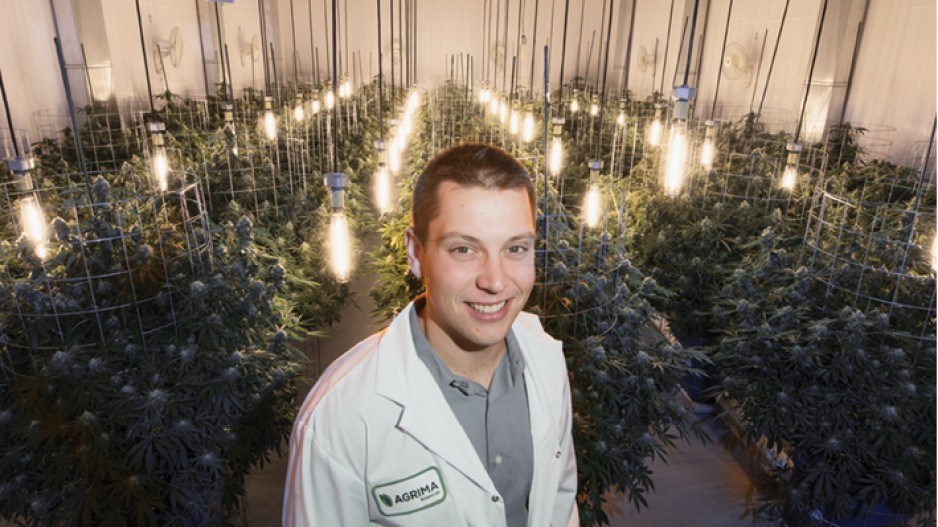For most of Vancouver’s young adults, marijuana is little more than something used to pass the time between college classes and part-time jobs.
But for 26-year-old James Poelzer, a Simon Fraser University graduate, there’s hope that marijuana could become a multimillion-dollar business.
Poelzer is the CEO of Agrima Botanicals, one of many new businesses hoping to take advantage of the changing legal landscape in British Columbia when it comes to marijuana.
In a hotbed of cannabis culture – from B.C. bud to marijuana policy reform advocate Marc Emery – Vancouver businesses are hopping on the weed wagon and hoping it will take them to high profits.
Agrima’s 25,000-square-foot facility in Maple Ridge was built to conform to Health Canada’s Marihuana Medical Access Regulations (MMAR), which allow domestic growers and dispensaries to sell medical marijuana. Come April 1, however, those rules will no longer apply, when the Marihuana for Medical Purposes Regulations (MMPR) come into effect and medical marijuana users can buy pot directly only from big growers like Agrima.
Poelzer’s company is one of more than 200 that applied for a licence to grow commercial marijuana. The facility has been running for a year under MMAR but has had to make some recent additions to conform to the new regulations.
“We have more security than your typical jail,” Poelzer said of the strict building requirements. “Under the MMAR there were really no security requirements whatsoever. Now they are quite extensive, so there are 50-plus cameras around the facility, as well as access controls on every door in the facility.”
The special equipment all that security is keeping safe includes an automatic computer system that controls carbon dioxide, temperature, humidity, light cycles and airflow.
“There’s also the growing systems,” said Poelzer. “So we’re working with a local manufacturer to produce the hydroponic equipment that we use in our systems and custom-designing that for exactly how we want it.”
While Agrima might be the poster business for B.C.’s medical marijuana reform, the construction of the massive facility and the fact that more like it may soon appear show that many different businesses can benefit from the rise of the new industry.
Des Soumang is the owner of Alpine Refrigeration, a company that specializes in commercial agribusiness heating, ventilation and air conditioning installation. Large medical marijuana facilities like Agrima require strict ventilation requirements, and so for him, this new industry represents lots of new business.
“You’ve got your UV filtration and HEPA [high-efficiency particulate absorption] filtration, it’s complete tight control,” Soumang said. “Each process has its own humidity and temperature expectancies.”
Even for specialist companies like Alpine, there are opportunities to expand into new business by taking advantage of the unique needs of facilities like Agrima.
“We designed the long-term storage vault for them as well,” Soumang said. “That’s my first vault. I’ve had a lot of think-outside-of-the-box kind of projects, and putting it together was just from field knowledge.”
Despite rapidly becoming an active industry, only a few facilities have acquired a licence to produce and sell medical marijuana under MMPR, but Poelzer isn’t worried about keeping up with demand, just maximizing supply.
“The unique thing about our business, like most agriculture, is that we have a limited supply. It’s not like we’re adding sugar and water and making pop – it’s growing a plant, and it takes time and it takes space,” he said. “We’re planning to go into it ready to supply at maximum capacity and expecting that there’s going to be a market there.” •
R&D opportunities abound as laboratories have greater access to legal pot
With many companies needing to update construction plans to accommodate for the MMPR, the businesses currently reaping the biggest rewards are contractors like Alpine Refrigeration. However, as regulations change, new businesses will be able to cash in on the emerging industry.
“We’re currently not allowed to use any pesticides or any substances on the plants,” said Agrima Botanicals CEO James Poelzer. Research is one of the main areas of innovation affected by the new regulations – for instance, Agrima has a close partnership with Simon Fraser University to research the effects of different products and technologies on marijuana plants.
MediJean is a Canadian biotechnology company that bought property in Richmond last year to create a medical marijuana research and development facility.
“It’s like what any pharmaceutical company would do,” said MediJean consultant Justin Ferguson. “Developing different types of medical marijuana and conducting research on it to enable strains to target specific ailments with better accuracy and consistency.”




